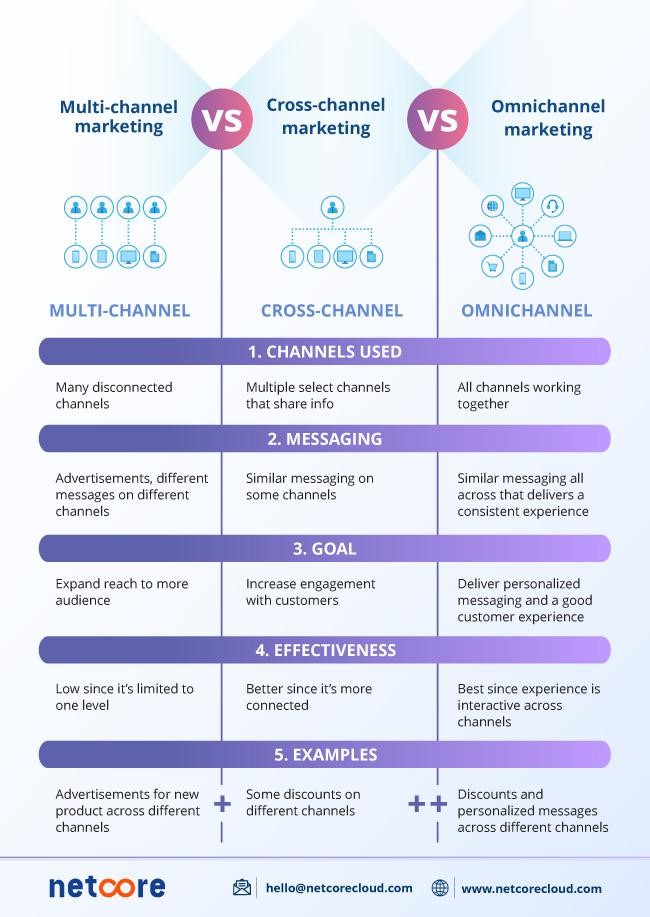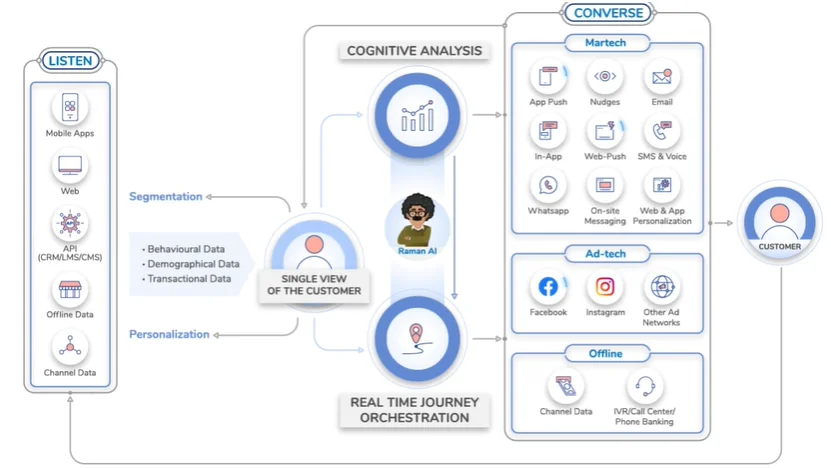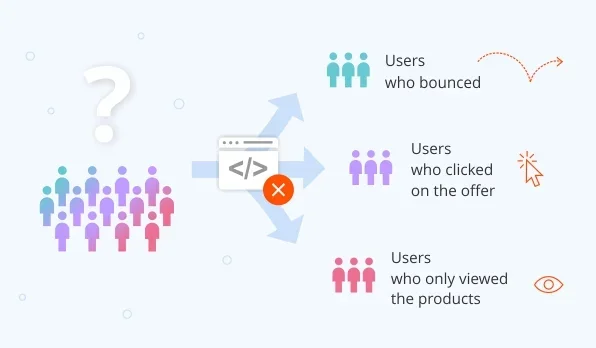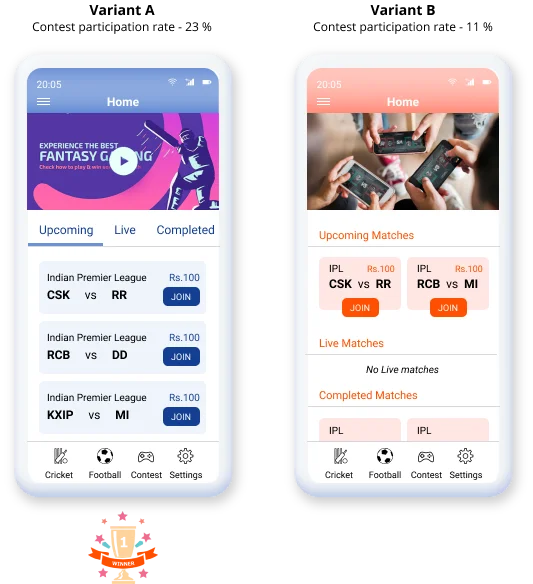Omnichannel marketing is simple in theory—connect every customer touchpoint into a seamless, unified experience. In practice? It’s where most brands stumble.
That’s because real omnichannel isn’t just “being everywhere.” It’s a unifying platform for email, SMS, push, web, social, and in-store interactions, delivering a single conversation—consistent in tone, context, and timing—powered by automation.
When done right, your campaigns stop feeling like marketing blasts and start feeling like well-timed, relevant nudges. The right platform makes this possible by giving you a single place to segment audiences, automate journeys, and adapt messages in real time.
In this guide, we’ll explore the best omnichannel marketing platforms that actually deliver on that promise—and the features that separate marketing noise from marketing impact.
TL;DR
This guide compares 10 leading omnichannel marketing platforms—HubSpot, Netcore, ActiveCampaign, Omnisend, Shopify, Zendesk, Adobe Experience Cloud, Mailchimp, Freshworks, and BigCommerce. Each offers unique strengths for unifying customer data, orchestrating campaigns, and personalizing engagement. Netcore stands out for AI-led personalization, predictive segmentation, omnichannel orchestration, and KPI-backed growth—making it a top choice for brands aiming to drive measurable results in 2026.
Multichannel vs Cross-channel vs Omnichannel marketing – What’s the difference?
You might have come across terms like multichannel, cross-channel, and omnichannel marketing, and they can sound pretty similar and confusing.
But here’s the thing: they actually have distinct differences and serve different purposes. In fact, one of them stands out as more impactful than the others.

1. Multichannel Marketing
This approach involves using multiple channels to reach and engage with customers. Each channel operates independently, and the focus is on having a presence across various platforms such as email, social media, websites, and physical stores.
However, the channels may not necessarily be integrated, resulting in fragmented customer experiences. Customers may receive different messages or offers depending on the channel they interact with.
2. Cross-Channel Marketing
Cross-channel marketing takes things a step further by integrating channels to provide a more cohesive customer experience. The emphasis is on creating a seamless transition as customers move between channels.
For example, a customer may start their interaction with a brand on social media, then continue browsing the website, and eventually make a purchase in-store. The goal is to maintain consistency and continuity across channels, ensuring a unified brand experience.
3. Omnichannel Marketing
Omnichannel marketing represents the most advanced and customer-centric approach. It aims to provide a truly integrated and personalized experience across all channels.
The focus is on creating a seamless and cohesive journey for customers, regardless of the channel or device they use. The key difference is that in an omnichannel strategy, all channels are connected and work together harmoniously, sharing data and insights to deliver a consistent and personalized experience at every touchpoint.
What is an Omnichannel Marketing Platform?
It’s a powerful software solution designed to help businesses orchestrate and automate their marketing campaigns across various channels while ensuring a consistent and delightful customer experience.
Think of an omnichannel marketing platform as your marketing command center. Such customer engagement software acts as the nucleus of your marketing efforts, amalgamating channels like emails, SMS, social platforms, and mobile apps under one umbrella.
This means you can create, manage, and automate campaigns across these channels, all from a single place.

Top Omnichannel Marketing Platforms to Consider in 2026
The right omnichannel marketing platform helps unify customer data, orchestrate campaigns across multiple touchpoints, and personalize engagement at scale. Here are 10 standout options to explore.
1. HubSpot
An all-in-one platform for marketing, sales, and service, HubSpot’s CRM centralizes customer data to deliver personalized, multi-channel communication across email, chat, social, and more.
2. Netcore
A full-stack AI-powered customer engagement platform built for high-growth B2C brands. Offers predictive segmentation, real-time personalization, and omnichannel orchestration across email, SMS, WhatsApp, push, and web—backed by KPI ownership for measurable growth.
3. ActiveCampaign
Known for powerful automation, ActiveCampaign lets you design multi-step workflows across email, SMS, and more, integrating with CRM systems to support marketing, sales, and customer success.
4. Omnisend
Specialized for e-commerce brands, Omnisend focuses on email, SMS, and push notifications with automated sequences, segmentation, and performance reporting.
5. Shopify
Primarily an e-commerce platform, Shopify also offers omnichannel features for syncing online and offline sales, inventory, and customer profiles.
6. Zendesk
A leading customer service platform that unifies conversations from email, chat, and social media—ideal for high-volume customer support.
7. Adobe Experience Cloud
Enterprise-grade solution covering personalization, analytics, and content management to optimize the full customer journey.
8. Mailchimp
Popular for email marketing but now offers social media campaigns, landing pages, and more—suited for small to mid-sized teams.
9. Freshworks
Combines Freshdesk for support and Freshmarketer for automation, providing easy-to-use omnichannel tools with a focus on customer experience.
10. BigCommerce
An e-commerce platform offering multi-channel selling, inventory management, and unified order processing for online and offline sales.
Key Capabilities to Look For in the Best Omnichannel Marketing Platform
When it comes to choosing the best omnichannel marketing automation platform for your business, there are several factors to consider. Here are some key considerations to help you make an informed decision:
1. Agentic Marketing Capabilities
The core advantage of agentic marketing is Autonomous Orchestration. Rather than requiring a marketer to manually map out every cross-channel workflow, the AI acts as an independent collaborator that decides which channel, be it mobile, web, or in-store, is best suited for a particular interaction. This creates a truly unified experience where the “agent” manages the transition between channels seamlessly, optimizing the path to purchase without human intervention and ensuring the brand message remains consistent and timely regardless of the platform.
2. Customization Options
Every brand has unique needs and requirements, so it’s crucial to choose customer engagement software that provides customization options. Look for a platform that allows you to customize templates and campaign workflows to align with your brand’s specific aesthetic and messaging.
Customization features enable you to create campaigns that reflect your brand identity and deliver a consistent experience across all channels.
3. Customer Segmentation and Targeting
Effective customer segmentation and targeting are essential for personalized marketing campaigns. Choose a customer engagement software that offers robust segmentation capabilities, allowing you to divide your customer base into specific segments based on attributes, behaviors, and preferences.
Dynamic segmentation is particularly valuable, enabling you to update customer segments in real-time and deliver highly relevant messages to each segment.

4. A/B Testing and Optimization
To maximize campaign performance, it’s crucial to experiment with different campaign elements and optimize based on results. Look for a customer engagement solution that includes A/B testing capabilities, enabling you to test different variations of subject lines, content, visuals, and CTAs.
With insights from these tests, you’re better positioned to drive customer engagement and secure higher conversion rates.

5. Mobile Optimization
Mobile devices play a significant role in customer engagement. It’s important to choose a platform that supports mobile-optimized campaigns. Look for features such as responsive email templates and mobile push notifications to ensure that your messages are displayed correctly and provide a seamless experience across various mobile devices. Mobile optimization enhances the user experience and increases the effectiveness of your campaigns.
6. Deliverability and Compliance
Deliverability is crucial for successful campaigns. When in the market for a customer engagement platform, emphasize those that focus on deliverability. Look for platforms that have established relationships with internet service providers (ISPs) and email service providers (ESPs) to ensure high inbox placement rates.
Additionally, check if the platform complies with industry regulations, such as GDPR or CAN-SPAM, to ensure that your campaigns adhere to legal requirements and maintain customer trust.
7. Real-time Tracking and Reporting
Tracking and reporting capabilities are vital for measuring the success of your campaigns and making data-driven decisions.
Opt for customer engagement software that grants instant monitoring and insights. These features should offer comprehensive campaign analytics, including metrics like click-through rates, open rates, conversion tracking, and return on investment (ROI) measurement.
Real-time tracking allows you to monitor campaign performance and make necessary adjustments to optimize results.
8. Personalization and Dynamic Content
Personalization is a key driver of successful marketing campaigns. Look for platforms that offer personalization features and dynamic content insertion. These features allow you to tailor messages based on customer data and preferences.
Merge tags, dynamic subject lines, and product recommendations are examples of personalization options that can significantly enhance the effectiveness of your campaigns. The ability to deliver relevant and personalized content creates a more engaging and meaningful customer experience.
9. Integration with Other Platforms
For businesses operating in different industries, integration with various other platforms is crucial. When selecting a platform, consider whether it seamlessly integrates with the popular platforms you use.
The integration allows for advanced features like cart abandonment campaigns, product recommendations, and purchase tracking. These features enable you to drive conversions, recover lost sales, and provide a cohesive customer experience throughout the entire customer journey.
10. Pricing and Scalability
Evaluate the pricing structure of the customer engagement solution to ensure it aligns with your budget and offers scalability options. Consider whether the pricing is based on the number of contacts, the volume of messages sent, or other factors relevant to your business.
Additionally, assess whether the platform can scale with your business as your marketing needs evolve. It should support increasing data volumes, growing customer bases, and expanding campaign complexities without compromising performance.
Final Take
According to an HBR study, 73% of shoppers use multiple channels while shopping—proof of the huge potential in omnichannel marketing automation. But to unlock its full value, you need automation working alongside your omnichannel strategy.
Automation removes the manual grind of segmenting and targeting, streamlining your campaigns while enhancing the customer journey. The result? More relevant, timely, and memorable interactions that build loyalty.
Netcore offers an intuitive, AI-powered omnichannel platform that lets you create, automate, and manage campaigns across all channels from one place. With personalized messaging, real-time performance tracking, and data-driven insights, you can confidently hit your KPIs while delivering experiences customers remember.
Book a demo today and see how Netcore can take your marketing to the next level.
 Worried About Your AI Marketing Strategy? Read the Agentic Marketing 2026 Predictions Report! →
Worried About Your AI Marketing Strategy? Read the Agentic Marketing 2026 Predictions Report! →










